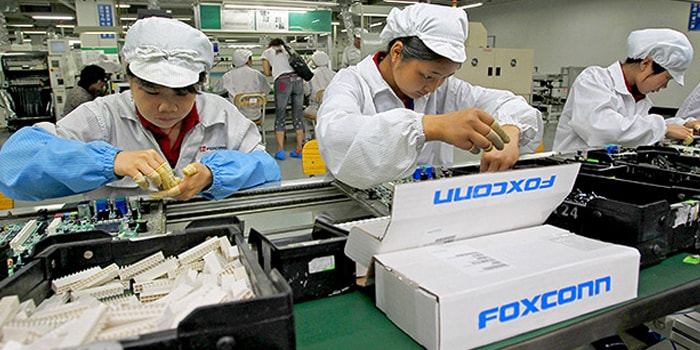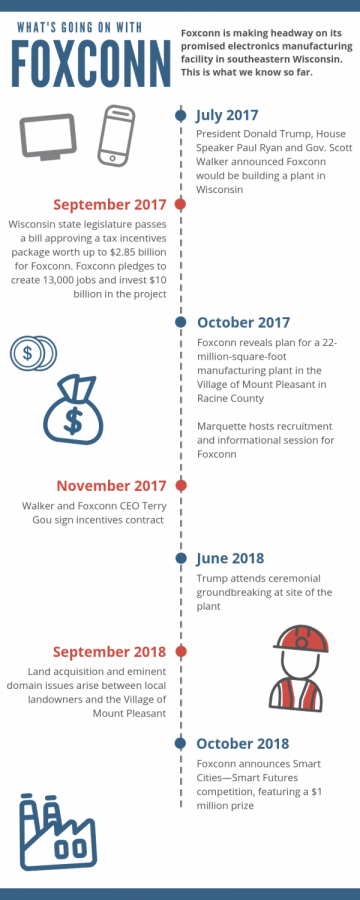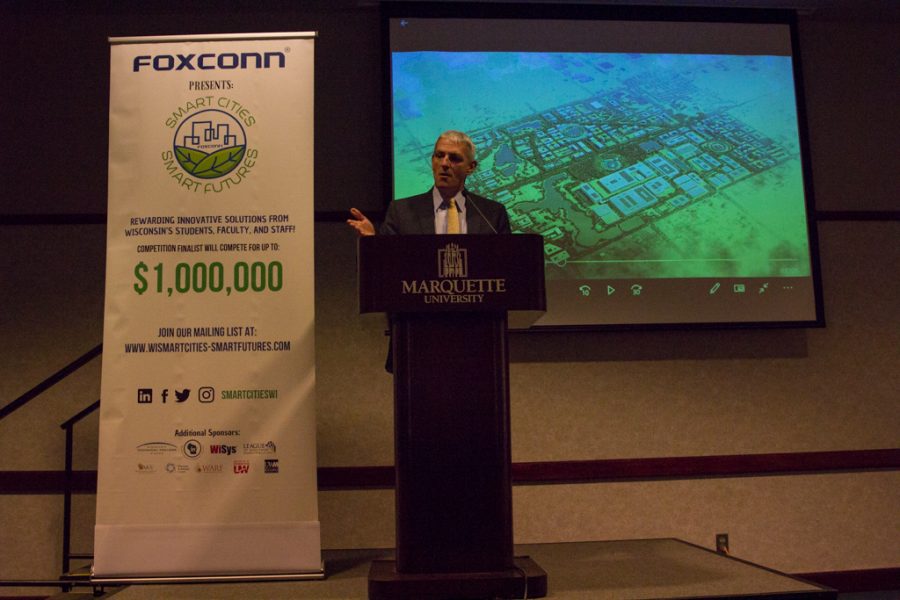In September 2017, Gov. Scott Walker signed a contract with Taiwanese manufacturing giant Foxconn for the company to construct a 21.5 million-acre plant in Mount Pleasant, Wisconsin. The company was expected to invest billions in the state economy, and employ up to 13,000 blue-collar Wisconsinites in exchange for $3 billion in state subsidies.
Although the money offered by Walker was by all accounts unprecedented, the Foxconn deal had the potential to revitalize Wisconsin’s withering manufacturing industry and possibly rebrand the state as the “Silicon Valley of the Midwest.” However, since the initial signing of the contract, the agreement between Wisconsin and Foxconn has become a waking nightmare for the state.
This nightmare, however, provides a valuable lesson for other states and future Wisconsin legislators to learn from – exercise caution while dealing with large corporations.
Over the past year and a half, the total amount of money Wisconsin agreed to subsidize has increased to more than $4.8 billion, making it the largest subsidy afforded to a foreign company in American history, according to Politifact. This figure means the state has agreed to pay upwards of $360,000 per job, which is estimated to cost more than $1,800 per household, according to Business Insider. Apart from being a significantly larger amount of money than what the state initially agreed to pay, this new total will delay the amount of time until tax payers see a return on their investment. The deal is guaranteed to be a financial drain on Wisconsin for more than 20 years, according to the Legislative Fiscal Bureau.
Moreover, since the initial deal, the number of jobs the tech company will actually make available to residents of Wisconsin has been questioned. In May 2018, Foxconn announced it would implement a plan for the plant to primarily employ skilled engineers and heavily utilize machinery in the manufacturing process. In this event, opportunities offered to local residents would be severely limited because a sophisticated understanding of engineering would be required to work at the Foxconn manufacturing plant. This essentially bars a vast majority of blue-collar workers from most positions.
Although Foxconn has promised that it will eventually fulfill its promise of hiring 13,000 Wisconsinites, it is anticipated that the tech firm is likely to import many engineers, as Wisconsin may not be able to supply all of the required skilled labor. Due to Mount Pleasant’s close proximity to Illinois, being less than 30 miles from the southern border, it is suspected that many of the initial 3,000 jobs offered by Foxconn will be occupied by individuals from Illinois, thereby not directly benefiting Wisconsin’s workforce.
Clearly, this bid to bolster Wisconsin’s commerce has spun out of control since its initial signing, a fact that has not gone unnoticed among state residents. According to a 2018 poll conducted by the Marquette University Law School, 49 percent of those surveyed said they believe the Foxconn deal is not worth the cost, compared to 38 percent of respondents who maintain that the cost to taxpayers is justified due to potential economic gains. Additionally, the fact that Walker, who stood to gain substantial public support as a result of the deal, was recently dethroned by Democrat Tony Evers, demonstrates a disillusionment with Walker’s policy decision to heavily subsidize the foreign company.
Simply put, the Foxconn deal has become an unfortunate example of states offering corporations overly extravagant incentives in return for a distant and often underwhelming economic reward. Even with a recent change in political office with the election of Evers, there is little that state government can do to significantly alter the agreement, except for some minor adjustments. As a result, the Foxconn deal should serve as a reminder that states should practice vigilance when making deals with corporations. Although there are examples of states and corporations reaching agreements that benefit both parties, as of late there has been an ever-increasing urgency for local government to attract and appease private companies – particularly those involved in manufacturing.
This attempt to restore the United States to its post-WWII levels of manufacturing, although appealing on the surface, has inspired state governments to make deals – such as the Foxconn agreement – that are ultimately detrimental to the taxpayers. As the United States continues forward, it is important to acknowledge that America is facing a difficult transition away from traditional manufacturing. The struggles that Wisconsin has endured as a result of the Foxconn deal are indicative of this rough intermediary state. While there is some potential to usher in new opportunities for factory workers, local and federal government would do well not to extend impractical offers in order to prop up a dying domestic industry.
Although some residents of Milwaukee may secure a position working for Foxconn, the number of city occupants employed by the company will be minimal due to the limited number of jobs offered, providing only minimal benefits for residents.










